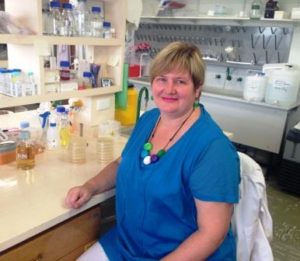
Microbiologists from Flinders University are teaming up with their Israeli counterparts at the Weizmann Institute to study how common bugs including E coli and Staphylococcus become resistant to antibiotics.
Funded through a $140,000 grant from the Australian arm of the Weizmann Institute of Science, Weizmann Australia, the teams will work collaboratively during the next two years to investigate the mechanisms by which bacteria block and flush out drugs, causing drug resistance.
The study is one of four major research projects to receive seed funding through Weizmann Australia’s 2013 grant program, which aims to link Australian and Israeli scientists.
Flinders microbiologist Professor Melissa Brown (pictured), who is leading the Flinders team, said the basic research aims to better understand how proteins on the outer surface of bacteria remove drugs from the organism as a survival mechanism.
“Bacteria are made up of lots of different components, some of which are proteins which act as a pump,” Professor Brown, Head of the Flinders Molecular Biology and Biotechnology Cluster and Associate Dean (Research) in the School of Biological Sciences, said.
“As antibiotics get into the cell these proteins pump the drugs out before they can act since the purpose of the drugs is to kill the bacteria, and the bacteria obviously want to survive so the pumps are their arsenal,” she said.
“This presents a serious obstacle for treating many cancers and infectious diseases.”
By understanding the molecular structure and mechanisms of the proteins, Professor Brown said scientists could modify otherwise ineffective antibiotics so they can “either not be recognised by the proteins or bypass them entirely”.
“At the moment there are some drugs we can’t use against certain bacteria, including E coli and Staphylococcus, because the bacteria are resistant to the drugs so eventually we might be able to reactivate them.
“Finding new drugs is really hard – it costs a lot of money and it doesn’t happen often so we’ve got to make the most of the existing ones.”
Professor Brown’s Israeli collaborator, Professor Eitan Bibi, will arrive at Flinders in November to launch the project before flying back to Israel to lead his team’s research input.
Weizmann Australia Chairman Stephen Chipkin said the organisation’s overall aim is to forge closer scientific links between the Weizmann Institute of Science and Australian scientists by providing seed funds to initiate or strengthen existing research ties.
“This will be good for Australian science and it will further strengthen the links between the two countries,” Mr Chipkin said.
“If the research leads to significant scientific breakthroughs, all of humanity will benefit.”


Do they take PhD students?
thanks